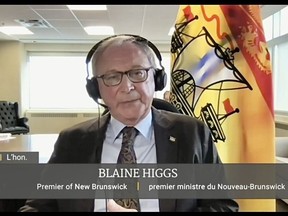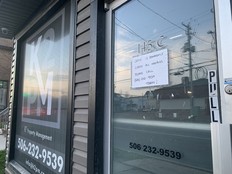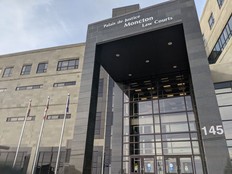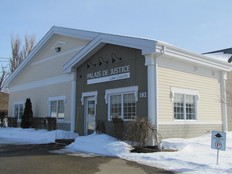Higgs pitches shale gas as better climate plan than carbon tax
But that’s as his appearance in front of a parliamentary committee quickly turned into a punchy back and forth

Article content
OTTAWA • Premier Blaine Higgs has pitched shale gas development in New Brunswick as a better climate plan than the carbon tax.
But that’s as his appearance in front of a parliamentary committee quickly turned into a punchy back and forth with Liberal and New Democrat MPs over what the Higgs government is doing on a number of other fronts driving up the cost of living in New Brunswick.
Appearing virtually in front of a House of Commons on Thursday, after he and several other Conservative premiers were invited by a Conservative committee chair to testify over their dislike of carbon pricing, Higgs faced questions over what’s being done to mitigate a looming 12.8 per cent NB Power residential power rate hike.
And he was repeatedly asked why he isn’t questioning oil companies after the price of gas has already gone up roughly 20 cents a litre in New Brunswick since the beginning of the year.
Instead, Higgs reiterated his call for a freeze to the 3.3-cent-a-litre carbon tax increase coming on April 1, and the complete elimination of carbon pricing that has added 14.3 cents a litre to the price of gas to date.
He pitched the need for the country to adopt environmental policy with a world view.
That long-held argument by Higgs would see New Brunswick dramatically expand natural gas development, and the province’s own emissions, in attempts to displace coal use worldwide, reducing overall emissions at a scale the premier contends domestic policy simply won’t do.
“With a consolidated effort from the federal government and the First Nations we can have an impact around the world by shutting down coal plants,” Higgs said in an opening address, adding that China is currently building 80 to 100 coal plants a year, while Europe has 174 that could be shut down, and Atlantic Canada has four.
“My plea here is across party lines to say let’s think bigger.”
Higgs questioned
But Higgs then faced a barrage of questions from Liberal and New Democrat MPs over his targeted fight of the carbon tax.
Fredericton MP Jenica Atwin noted that a call for an emergency debate in the provincial legislature over a 12.8 per cent residential power rate hike to hit New Brunswickers on April 1 was shut down.
Instead, Higgs was available to talk about the carbon tax.
“Is this a case of look over here, and not what I have control over back at home?” Atwin said.
The Fredericton MP then read quotes from Higgs he made last year after he scrapped his own government’s made-in-New Brunswick carbon pricing in favour of the federal carbon tax, citing how New Brunswickers would get rebate cheques.
She then pressed Higgs on legislation his government passed to allow the cost of federal clean fuel regulations to be passed onto consumers, rather than see refineries pay, an amount that originally added eight cents to the price of gas in New Brunswick.
“How much of this is rebated back to New Brunswickers?” Atwin asked.
Later, NDP MP Taylor Bachrach questioned why Higgs isn’t speaking out against oil companies, citing large profit margins by refineries during the pandemic.
Bachrach added the price of gas in New Brunswick has already gone up roughly 20 cents in the first four months of this year without any change in the carbon tax.
New Brunswick Energy and Utilities Board data shows that the maximum price of unleaded regular gas started the year in the province at 154.2 cents litre and is now 173.6 ahead of the 3.3 cent increase coming on Monday.
Repeatedly, Higgs responded that Canada’s domestic environmental policy, in particular the carbon tax but also clean fuel regulations and other federal rules, increase costs with negligible impact to overall world emissions.
“People are just going to pay more and pay more and what is going to be the impact on the environment? Is it going to be like eight per cent of our 1.5 per cent and we think we’re solving the problems of the world by doing that?” Higgs said.
The comments seem to cite the findings of a recent independent analysis from the Canadian Climate Institute that consumer carbon pricing accounts for between eight and nine per cent, or 19 to 22 megatonnes, of projected emissions reductions in the country.
That’s as Canada makes up 1.5 per cent of global emissions.
“We’re thinking in a bubble,” Higgs said.
Shale gas
Throughout the meeting, Higgs was asked for his domestic alternative to the carbon tax.
“I’m yet to hear your plan,” Saint John-Rothesay MP Wayne Long said repeatedly. “What is it?”
But Higgs returned each time to shale gas development.
He went as far to say that he still has the business case to do it, just not the gas to send, acknowledging that export terminal proposals in Atlantic Canada recently fell through due to the cost of getting western or American gas to the East Coast.
“We have gas in the province and we have pipelines already connecting that gas supply, so it’s a matter of utilizing them,” Higgs said, suggesting only the need for a “moderate” expansion.
“I could sign tomorrow a 20-year agreement with a country in Europe for gas supply.”
He later said that country is Czechia, but there is also interest from several other countries. The heads of both Germany and Greece have also expressed interest in recent visits to Canada.
Atwin brought up widespread protests across the province, including from First Nations, amid a push for shale gas development in the province a decade ago.
“Has that relationship changed at all?” she asked.
Higgs responded: “I would think the reality is starting to set in that this is a huge economic benefit.”
“It’s developing our gas resource and our LNG plant that you and I both live close to, ship to Europe, and shut down coal plants,” Higgs said to Long. “It would create $3 billion of investment in Saint John and it would mean multimillions to the First Nations and it’s doing exactly what is happening out west (with the creation of export capability).”
Long shot back: “And that’s how we’re going to reduce emissions in our province (to net zero) by 2050?”
Higgs replied: “Worldwide. Worldwide.”












Postmedia is committed to maintaining a lively but civil forum for discussion. Please keep comments relevant and respectful. Comments may take up to an hour to appear on the site. You will receive an email if there is a reply to your comment, an update to a thread you follow or if a user you follow comments. Visit our Community Guidelines for more information.